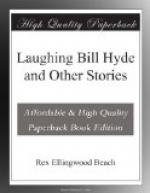“I did the work on a tundra claim,” said Folsom; “the Lulu—”
“The Lulu!” Folsom’s friend stared at him. “Haven’t you heard about the Lulu? My God! Where you been, anyhow? Why, the Lulu’s a mint! Guth is a millionaire and he made it all without turning a finger.”
Folsom’s grip on the bar-rail tightened until his knuckles were white.
“I’m telling you right, old man; he’s the luckiest Jew in the country. He let a lay to McCarthy and Olson, and they took out six hundred thousand dollars, after Christmas.”
“Guth offered me a—half interest in the Lulu when his store burned and—I turned it down. He’s never paid me for that assessment work.”
The Nomeite was speechless with amazement. “The son-of-a-gun!” he said, finally. “Well, you can collect now. Say! That’s what he meant when he told me he wanted to see you. Guth was down to the boat when I left, and he says: ’If you see Folsom up river tell him to come back. I got something for him.’ Those were his very words. That little Jew aims to pay you a rotten hundred so you won’t sue him for an interest. By Gorry, I wouldn’t take it! I’d go back and make him do the right thing. I’d sue him. I’d bust him in the nose! A half interest—in the Lulu! My God!” The speaker gulped his drink hastily.
After consideration, Folsom said: “He’ll do the right thing. Guth isn’t a bad sort.”
“No. But he’s a Jew; trust him to get his.”
“I wouldn’t ask him to do more than pay his debt. You see I refused his offer.”
“What of that? I’d give it a try, anyhow, and see if he wouldn’t settle. There’s lots of lawyers would take your case. But say, that’s the toughest tough-luck story I ever heard. You’ve sure got a jinx on you.”
“I’m going back, but I won’t sue Guth. I’m sick of Alaska; it has licked me. I’m going out to God’s country.”
Folsom indeed acknowledged himself beaten. The narrow margin by which he had missed reward for his work and his hardships bred in him such hatred for Alaska that he abruptly changed his plans. He had no heart, perversity had killed his courage. It exasperated him beyond all measure to recall what little things his luck had hinged upon, what straws had turned his feet. A moment of pique with Lois, a broken piece of steel, a match, a momentary whim when Guth offered him payment. It was well that he did not know what part had been played by his quarrel with Harkness, that wet muk-luk, that vicious lead dog, and the storekeeper’s wager.
Folsom carried cord-wood to pay for a deck passage down river. He discovered en route that Guth had really tried to get in touch with him, and in fact appeared greatly concerned over his failure to do so, for at Tanana he received another message, and again at St. Michaels. He was grimly amused at the little Jew’s craftiness, yet it sorely offended him to think that any one should consider him such a welcher. He had no intention of causing trouble, for he knew he had no legal claim against the fellow, and he doubted if he possessed even a moral right to share in the Lulu’s riches. To play upon the Hebrew’s fears, therefore, savored of extortion. Nevertheless, he was in no agreeable frame of mind when he arrived at his destination and inquired for Guth.




